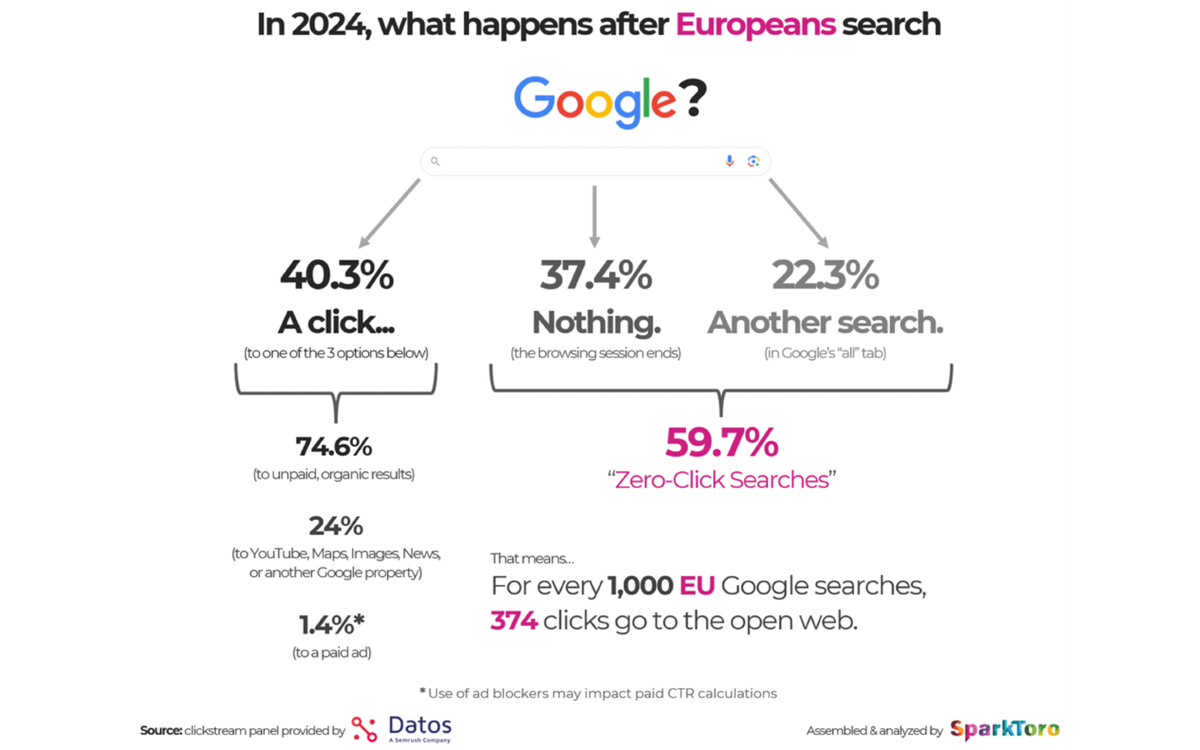
SparkToro this month released its latest study on Google search behavior, revealing a stark decline in organic clicks to websites from search results. The comprehensive analysis, conducted by Casey Henry and Rand Fishkin, examined over 1.6 million Google searches across the United States and European Union, shedding light on how Google's evolving search features are reshaping web traffic patterns. This development has significant implications for website owners, marketers, and the broader digital ecosystem.
According to the study, for every 1,000 Google searches in the United States, only 374 clicks now go to the open web. This figure represents a substantial decrease from previous years, highlighting a growing trend of "zero-click" searches where users find the information they need directly on the search results page without clicking through to any website. In the European Union, the situation is even more pronounced, with just 360 clicks per 1,000 searches leading to external websites.
The study's methodology involved analyzing a vast dataset of search queries and user behaviors. SparkToro utilized a combination of clickstream data and advanced analytics to track user interactions with search results across various devices and demographics. This approach allowed for a comprehensive view of search behavior trends, providing insights into how users engage with Google's search features and the resulting impact on organic traffic to websites.
To fully appreciate the significance of these findings, it's essential to understand the context of Google's search evolution. Over the past decade, Google has introduced numerous features aimed at providing users with immediate answers to their queries directly on the search results page. These features include featured snippets, knowledge panels, and rich results, which display information extracted from websites without requiring users to click through to the source.
While these features undoubtedly enhance user experience by providing quick answers, they have also led to a significant shift in how users interact with search results. The concept of "zero-click searches" has emerged as a growing concern for website owners and content creators who rely on organic search traffic to drive visitors to their sites.
The implications of this trend are far-reaching. For businesses and organizations that depend on web traffic for revenue, visibility, or engagement, the decline in organic clicks poses a significant challenge. Content creators may find it increasingly difficult to attract visitors to their websites, potentially impacting their ability to monetize their content or build an audience.
Moreover, the study raises questions about the future of the open web and the role of search engines in shaping online information access. As more information is consumed directly on search engine results pages, there are concerns about the potential centralization of information and the long-term viability of independent websites.
 PPC LandLuís Daniel Rijo
PPC LandLuís Daniel Rijo
The SparkToro study also delves into the technical aspects of how Google's search features impact click-through rates. The researchers analyzed various types of search queries and their corresponding results, identifying patterns in user behavior based on the presence of specific search features. For instance, searches that trigger featured snippets or knowledge panels were found to have significantly lower click-through rates to external websites compared to traditional organic search results.
One of the most striking findings of the study is the disparity between mobile and desktop search behaviors. Mobile searches, which now account for the majority of Google queries, show an even lower propensity for clicks to external websites. This trend is likely due to the limited screen space on mobile devices and the effectiveness of Google's mobile search features in providing quick answers.
The researchers also examined the impact of Google's various search verticals, such as image search, video search, and news. Interestingly, these specialized search features often exhibited higher click-through rates to external websites compared to general web searches. This finding suggests that users engaging with specific types of content may be more likely to seek additional information beyond what's provided in the search results.
To put these findings into perspective, it's helpful to compare them with historical data. In a similar study conducted by SparkToro in 2020, the percentage of zero-click searches was already significant but has since grown substantially. This trend indicates an acceleration in the shift towards on-SERP (Search Engine Results Page) information consumption, reflecting Google's continued efforts to enhance its search capabilities and user experience.
The implications of this trend extend beyond just website traffic. As organic clicks decline, the value proposition of search engine optimization (SEO) may need to be reevaluated. Businesses and content creators may need to adapt their strategies to focus on optimizing for visibility within Google's search features, rather than solely aiming for traditional organic rankings.
Furthermore, the study raises questions about the competitive landscape of the internet. As Google increasingly becomes the primary source of information for many users, concerns about market dominance and the impact on smaller websites and businesses come to the fore. This has already led to regulatory scrutiny in various jurisdictions, with discussions ongoing about the role of large tech companies in shaping access to information online.
The researchers at SparkToro also explored potential factors contributing to the decline in organic clicks. One significant element is the increasing sophistication of Google's natural language processing capabilities, which allow the search engine to extract and present relevant information more effectively. Additionally, the integration of AI-driven features, such as Google's MUM (Multitask Unified Model), enables the search engine to understand and respond to complex queries with unprecedented accuracy.
Another factor worth considering is the changing nature of user expectations. As users become accustomed to receiving instant answers, their search behaviors adapt accordingly. This shift in user behavior creates a feedback loop, further incentivizing search engines to prioritize immediate answer delivery over traditional website referrals.
The study also touched upon the potential long-term consequences of this trend on the broader internet ecosystem. As websites receive fewer clicks from search results, there may be a decline in the creation of in-depth, high-quality content. This could lead to a paradoxical situation where search engines struggle to find authoritative sources to extract information from, potentially impacting the quality of search results in the future.
To address these challenges, the researchers suggest that website owners and content creators may need to diversify their traffic sources and explore alternative ways to engage their audience. This could include focusing on building direct relationships with users through newsletters, social media, or community-building efforts.
The findings of this study have sparked discussions across the digital marketing and web development communities.
The implications of this study extend beyond just marketing and SEO. There are broader questions about the future of information access and the role of search engines in shaping public knowledge. As more information is consumed directly through search interfaces, there are concerns about the potential for bias, the diversity of perspectives presented, and the long-term impact on critical thinking skills.

